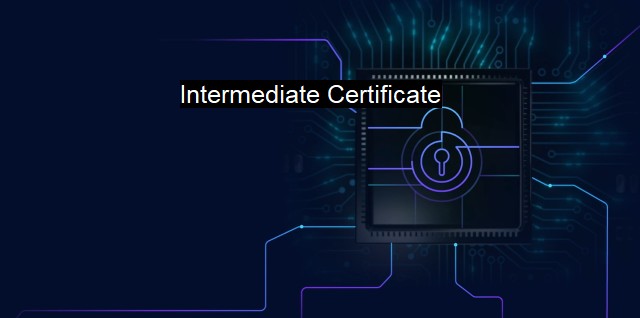What is Intermediate Certificate?
The Role of Intermediate Certificates in Cybersecurity: A Comprehensive Guide for Antivirus Protection
An "Intermediate Certificate" plays a pivotal role in maintaining the integrity, confidentiality, recognized identity, stability, and mutual trust of a system or network. It forms a vital part of Public Key Infrastructure (PKI) that revolves around the distribution and reputation of digital certificates to authenticate the identity of individuals, computers, websites, servers, and other devices involved in secure online transactions.The issuance of digital certificates is done by trusted third parties known as Certificate Authorities (CAs). These CAs issue certificates under a hierarchical structure encompassing a Root Certificate, Intermediate Certificate, and Server or End User Certificate. With privacy and security being a mandate in digital transactions, certificates authenticate the identity of servers and encrypt data during transmission, reinforcing a trusted link between users and servers.
The reading of cryptographic keys during secure communication with a server is authorized by presenting a thoroughly verified digital certificate, issued by a trusted CA. But, the greater the trustworthiness of the CA, the higher potential for substantial damage in case it falls victim to a security breach. Imagine among myriad issued certificates, one falls into the wrong hands. The whole structure of trust goes for a toss.
To reconcile the degree of risk posed by using Root Certificates for certifying keys directly, a hierarchy of trust utilising Intermediate Certificates was developed. This fortified hierarchy safeguards the Root Certificate and places an Intermediate Certificate in the line of vulnerability without risking the highest level of trust (Root CA).
An Intermediate Certificate functions as a subordinate to the Root Certificate and as a superior to the Server/End-user Certificate. But, it never directly interacts with the server or end-user certificate. It is stored offline to shield it from potential attacks. Instead, it issues digital certificates to the end servers or users, and it reveals this trust relationship through a signed electronic document called a Certificate Signing Request (CSR).
CSRs are submitted by individuals, servers, or systems requesting a certificate, thereby firmly establishing a trusted chain of CAs. A CA receives a CSR, validates the information, and issues a certificate using its private key. This resultant certificate contains the public key of the applicant, which, along with the CSR, comprises the entity's digital identity.
Why are Intermediate Certificates critical to cybersecurity? Three reasons compel the importance of Intermediate Certificates: Enhanced trust value, revocation facilitation, and higher security assurance, especially in the antivirus landscape.
Firstly, the hierarchical system amplifies trust value. The Root Certificate and Intermediate Certificate generate an unbroken “chain of trust.” An end user can trace back through the chain, validating each link, further affirming the credibility and offering strong protection against unauthorized access.
Secondly, while managing a colossal volume of certificates, inadvertent errors might creep in. The Intermediate Certificate entities offer simplified revocation databases. In case of mis-issued certificates, the fallout can be contained and addressed with added ease.
Lastly, the digital world-mounted security attacks impose rigorous security measures. Intermediate certificates add an extra defense layer by reducing the risk associated with the Root Certificate. While it's crucial to secure the Root Certificate, using Intermediate Certificates provides enhanced security assurance by minimizing direct interactions, thereby decreasing the risk of compromise.
The Intermediate Certificate not only presents inherent security advantages but also delivers operational benefits. It ensures a consolidated degree of trust and upholds an automated system monitoring the issuance, renewal, revocation of a large number of certificates. Intermediate certificates are an essential security mechanism, indispensable in an interconnected world where cybercrime lurks around virtual corners.

Intermediate Certificate FAQs
What is an intermediate certificate in cybersecurity and antivirus?
An intermediate certificate is a digital certificate that is issued by a trusted root certificate authority to secure communications between servers and clients. It acts as a bridge between the root certificate and the end-user certificate, and helps to establish trust and secure the communication.Why is an intermediate certificate important in cybersecurity and antivirus?
An intermediate certificate is important because it helps to verify the authenticity of the end-user certificate and establish a secure connection between the server and the client. Without it, there would be no way to validate the end-user certificate or ensure that the communication is trustworthy.How does an intermediate certificate differ from a root certificate?
A root certificate is the top-level certificate in a certificate chain that identifies the certificate authority (CA) that issued it. An intermediate certificate, on the other hand, is issued by a root certificate and is used to create a chain of trust between the root certificate and the end-user certificate. While the root certificate is self-signed, the intermediate certificate is signed by the root certificate.What happens if an intermediate certificate is compromised in cybersecurity and antivirus?
If an intermediate certificate is compromised, it can lead to a breach of trust and a compromise of the communication between the server and the client. Any certificates that were issued by the compromised intermediate certificate would also be compromised. Therefore, it is important to ensure that intermediate certificates are stored securely and managed carefully to prevent unauthorized access or theft.| | A | | | B | | | C | | | D | | | E | | | F | | | G | | | H | | | I | | | J | | | K | | | L | | | M | |
| | N | | | O | | | P | | | Q | | | R | | | S | | | T | | | U | | | V | | | W | | | X | | | Y | | | Z | |
| | 1 | | | 2 | | | 3 | | | 4 | | | 7 | | | 8 | | |||||||